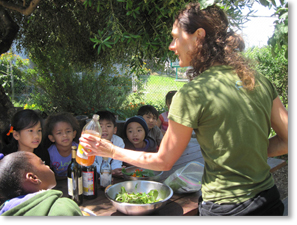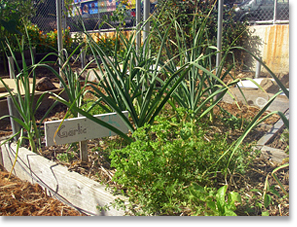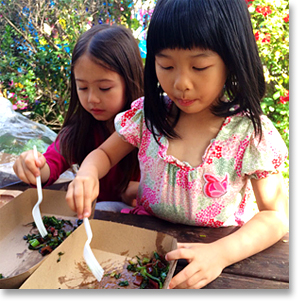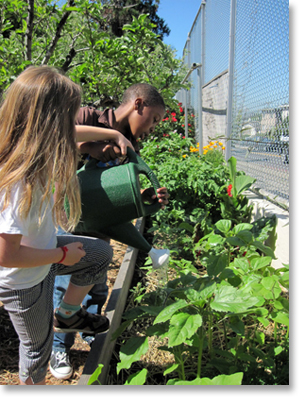|
Green Thumbs, Green Minds
In Oakland "... the transformation that takes place in a garden" by Paul Rockwell Oakland, California |
||||||||||||||||||
So reads a poster on the toolshed in the Sequoia Elementary School garden in Oakland, California. Last week I visited Kyra Rice’s garden classes (K through 2nd grades). I talked with Kyra, hung out with her tiny horticulturists, and got a chance to observe the impact of edible schoolyards on the very young. Kyra provides outdoor instruction for more than 250 students each week. She does her own home gardening, is trained in permaculture, and she was a teacher at Galileo School of Visual Arts and Technology (S.F.) before she came over to Sequoia. “We spent the entire week preparing compost,” Kyra told me. “The kids gathered green scraps, piled on dead leaves, adding black soil, and I contributed a bag of worm castings from my yard. There were enough eggs to produce more worms.” Two huge, brightly colored cisterns store water from the Sequoia roof. No herbicides, fungicides or pesticides are used in the Sequoia garden. The students keep the garden pest-free by handpicking bugs off of the plants and seedlings. Some kids wanted to kill the bugs, but Kyra intervened. “Some bugs are a nuisance in the garden, but the same bugs become beneficial in the compost pile. They break down the soil.” Soon the students transferred the bugs from the plants to the compost bin. “If you find a rolly polly, put it in the compost bin. Don’t kill it. The first rule is to respect all life.” The Value of Outdoor Education Kyra and I found a moment to talk about the value of outdoor education. “Instinctively kids love and understand nature.” “Nevertheless,” she added, “young people get disconnected. They get trained away from the natural world. When Sequoia students first came to my garden class, some of the kids were afraid to get their sneakers dirty. They didn’t want to walk on the soil.” Garden programs provide balance to test-driven, high-tech education. I get to see the transformation that takes place in a garden. When students develop a relationship to living things, they calm down. Not always immediately, but over the years their attitude changes. There is more respect, more gentleness. When they are able to use their senses, they light up. They are more connected in themselves.” Root Tasting Exercise I watched her second grade class “light up” during a root-tasting exercise. She set up an easel at the worktable by the raised beds in the north garden. Then she drew a big diagram of a plant and its roots. She opened a bag and began to distribute slices of root vegetables -- yams, turnips, radishes. Each child got a chance to taste a root. Like wine-tasting connoisseurs, they savored the texture and flavor of the veggie:
Ever positive, Kyra added: “We have good veggie eaters here.” The Power of Sensory Experience Before she came to Sequoia, Kyra Rice gained teaching experience at a Montessori school. I cannot help but compare her approach to Alice Waters, who founded the Edible Schoolyard at Martin Luther King Jr. Middle School in Berkeley. Before the famed cook and educator launched a soil-to-skillet revolution, Waters trained in Montessori education and taught at a Montessori school in Berkeley. “Nourishing,” as Waters writes, “the whole child and encouraging children to learn by doing things with their own bodies and hands by touching and tasting and smelling in an ongoing education of the senses.” Before I left school, I told Kyra, “ I think gardens are magical. Growth is a miracle.” But she cautioned me. “This is not some mystical thing. It’s basic sensory experience.”
|
||||||||||||||||||
If you have any thoughts on this or would like to contribute to an ongoing discussion in the  What is New? || Affirmative Action || Art Changes || Autonomy: Chiapas - California || Community Images || Education Rights || E-mail, Opinions and Discussion || En español || Essays from Ireland || Global Eyes || Healthcare || Human Rights/Civil Rights || Piri Thomas || Photo of the Week || QA: Interviews || Region || Rural America || Search || Donate || To be notified of new articles || Survey || In Motion Magazine's Store || In Motion Magazine Staff || In Unity Book of Photos || Links Around The World || OneWorld / US || NPC Productions Copyright © 1995-2014 NPC Productions as a compilation. All Rights Reserved. |






